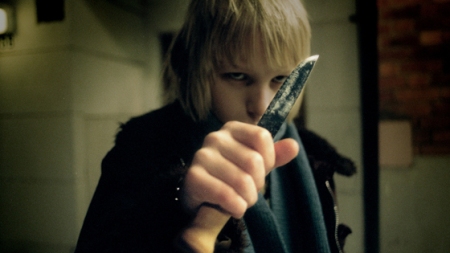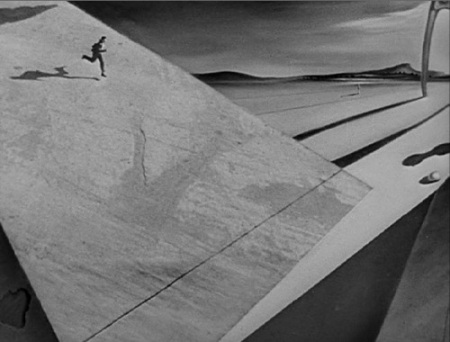
“Haunting blanched beauty”
The first time I saw this I was so enchanted by it that I concluded my notes with the words “If this film isn’t the best of the year, then I may not live through the one that beats it”. I have to say that I was probably underselling it. The first time I saw this- on a leaked screener played on a small screen- I probably didn’t truly appreciate the haunting blanched beauty of the film or its stunning soundtrack (by Johan Söderqvist). Well I do now.
Tomas Alfredson’s film has been trailed over here as a pretty standard horror film (I haven’t seen the trailer but it is apparently very generic). The poster, reproduced at the bottom, doesn’t give a sense of what is to follow at all. I suppose the aim is laudable- get bums on seats and let the quality win them over- but filling screenings with people expecting eye-popping gore and sudden shocks doesn’t seem very fair upon either them or upon the people who might want to watch something beautiful and romantic and may then miss this on the basis that it is being sold as if it was The Omen Part 14 or something. Tough call.
I’m not even sure that it is a horror film, even after seeing it twice. There are horrific elements of course, but the film is more than that. It is a coming-of-age film, a love story, a film about childhood and loneliness and resilience and pain and conventionality and unconventionality. There is a theme in Sam Mendes’ overrated but nonetheless impressive American Beauty about seeing beauty where others don’t and that applies equally here. Oskar (Kåre Hedebrant) is an outsider, bullied and ostracized by his classmates and misunderstood by his family but Eli (Lina Leandersson) connects with him in the same way that, we are led to presume, Eli connected with Håkan (Per Ragnar) before him. What Eli connects with isn’t Oskar’s vulnerability or loneliness, despite this being their common ground, it is his latent rage (the first words Eli hears from him are “Squeal! “Squeal like a pig!”) and his total detachment from the conventional standards and expectations of the people around him. When he strikes his erstwhile tormentor Conny (Patrik Rydmark), his immediate reaction to seeing the blood and pain is one of curiosity which turns to delight. And this is the most interesting aspect of their friendship- Eli is the vampire with a capacity for violence which is tempered by a disregard for it while Oskar’s capacity for violence is latent and expressed only through his fascination with newspaper reports of murders and his knife.

The theme of seeing the beauty in unexpected places extends to the visuals of the film itself. The icicles on the climbing frame, Oskar’s snot running from nose to mouth, dripping blood in the snow, the hand-print fading on a windowpane, Oskar resurfacing in the swimming pool- no matter how mundane the subject, a perverse beauty is created by cinematographer Hoyte Van Hoytema.
Something that struck me on second viewing was the possibility that the very final scene (on the train) doesn’t happen. What if Oskar dies and this is his dying thought? He certainly appears to die- he ceases to struggle, he doesn’t inhale upon resurfacing, he has a beatific smile upon his face- but this is purely speculation. The only real clue is the complete lack of reaction from Conny’s brother when another boy is dragged away by Eli- his hand doesn’t react at all- but is that really a clue. It’s dodgy territory this, where does it stop; what if the whole thing was in his imagination? I prefer the more literal ending. It makes more sense that, with Oskar taking the place of Håkan, the story turns full cycle. There are signposts to this throughout the film- Håkan’s jealousy of Eli’s new friend as he watches from the window, Eli’s tender gesture when he asks her not to see Oskar that evening, the way in which Håkan targets the ‘normal’ boys who would be Oskar’s tormentors and would have been his own.
My descriptive powers are pitifully inadequate for the task of conveying my admiration of Let The Right One In. 10/10




 Posted by Vern McIlhenney
Posted by Vern McIlhenney 










 And so, this is definitely a film I enjoyed seeing a second time. In fact, it had made me feel eager to re-engage with Woody Allen after sulking about his poor calibre output over the last twenty years and ignoring him for quite some time.
And so, this is definitely a film I enjoyed seeing a second time. In fact, it had made me feel eager to re-engage with Woody Allen after sulking about his poor calibre output over the last twenty years and ignoring him for quite some time.